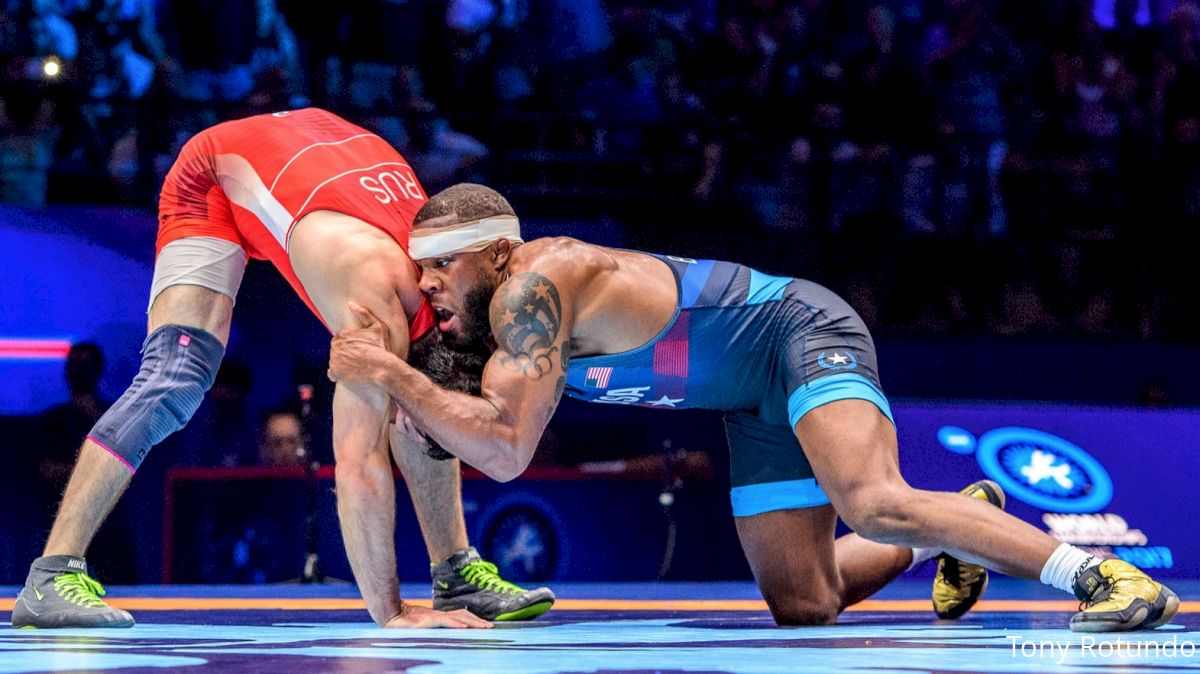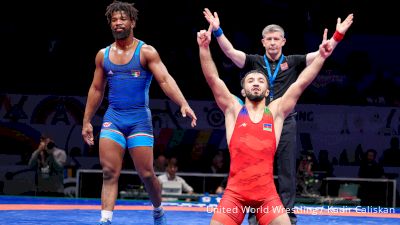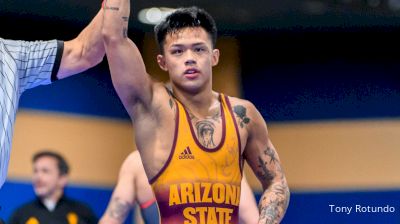How Short Offense Won The US A World Title
How Short Offense Won The US A World Title
The United States senior men's freestyle wrestling team won its first world championship in 22 years this past week in Paris. Here's a look at how three of the USA's medalists used short offense to power the team to gold.

The United States senior men's freestyle wrestling team won its first world championship in 22 years this past week in Paris. We can attribute our success to a ton of different things, but coming from a strictly technical standpoint, short offense made all the difference.
Traditionally, the U.S. has struggled in positions like short offense internationally. We spend far too much time in the position, and the referee inevitably blows the action dead and returns us to a neutral position. We were faster to progress from the position, and even our younger wrestlers were making adjustments in the position mid-match.
Here's a look at how three of the USA's medalists used short offense to power the team to gold.
It used to be that people respected the double so much that they would almost stay in a four-point stance against Burroughs until they made contact. When Burroughs started to switch directions in short offense and attack both sides, you could almost hear the rest of the 74kg weight class sigh in defeat.
In his match against Ali Shabanau from Belarus, Burroughs gives up the first two takedowns and doesn't score a takedown of his own until the second period when he starts gets his opponent under him.
Usually if you are attacking two underhooks, you're being defensive (i.e. you have no real interest in scoring, simply not getting scored on). Not only is that an inherent defensive position, but it's also pretty difficult to create an angle from there. Instead of being defensive from that position later in that match, Gilman went to one underhook and an overhook on the other side, which means that he starting to cheat to one side.
Once Gilman started to gain confidence from that position, you saw him cheat more and more to the right hand side every time he pulled the cranium into short offense. That confidence proved fruitful for the rest of the tournament.
Snyder has alway been great at hand fighting to leg attacks, but unless I haven't been paying attention (I've been paying attention) he has never been more effective from short offense as he was in Paris. Snyder's first takedown sequence in the finals against Abdulrashid Sadulaev started from a front headlock.
As Snyder pressured Sadulaev toward the line, the Russian dragged his head out. Snyder followed and they wound up chest to chest. As Sadualev pushed in for a step-out, Snyder angled his body and for a cheap takedown on the line. The rest, as they say, is history. Snyder went to Paris as a hero and came back a legend, thanks, in small part, to his short offense game.
Traditionally, the U.S. has struggled in positions like short offense internationally. We spend far too much time in the position, and the referee inevitably blows the action dead and returns us to a neutral position. We were faster to progress from the position, and even our younger wrestlers were making adjustments in the position mid-match.
Here's a look at how three of the USA's medalists used short offense to power the team to gold.
Jordan Burroughs, Gold, 74kg
In Paris, we saw the resurgence of Jordan Burroughs' double leg. One big reason Burroughs was able to finish that double at the rate in which he did was because of his development as a major threat from short offense.It used to be that people respected the double so much that they would almost stay in a four-point stance against Burroughs until they made contact. When Burroughs started to switch directions in short offense and attack both sides, you could almost hear the rest of the 74kg weight class sigh in defeat.
In his match against Ali Shabanau from Belarus, Burroughs gives up the first two takedowns and doesn't score a takedown of his own until the second period when he starts gets his opponent under him.
Thomas Gilman, Silver, 57kg
Thomas Gilman may be one of the best cases to look at when it comes to improving on short offense position. In his first match against the Ukraine's Andriy Yatsenko, Gilman wound up in short offense with two underhooks and got scored on from the position when the Ukrainian dumped him to his back.Usually if you are attacking two underhooks, you're being defensive (i.e. you have no real interest in scoring, simply not getting scored on). Not only is that an inherent defensive position, but it's also pretty difficult to create an angle from there. Instead of being defensive from that position later in that match, Gilman went to one underhook and an overhook on the other side, which means that he starting to cheat to one side.
Once Gilman started to gain confidence from that position, you saw him cheat more and more to the right hand side every time he pulled the cranium into short offense. That confidence proved fruitful for the rest of the tournament.
Kyle Snyder, Gold, 97kg
When you hear conversations about what, exactly, it takes to win multiple gold medals at a senior level, "growth" is usually at the top of the list. If you don't add to your game, it's only a matter of time before someone knocks you off. Kyle Snyder has added short offense to his game.Snyder has alway been great at hand fighting to leg attacks, but unless I haven't been paying attention (I've been paying attention) he has never been more effective from short offense as he was in Paris. Snyder's first takedown sequence in the finals against Abdulrashid Sadulaev started from a front headlock.
As Snyder pressured Sadulaev toward the line, the Russian dragged his head out. Snyder followed and they wound up chest to chest. As Sadualev pushed in for a step-out, Snyder angled his body and for a cheap takedown on the line. The rest, as they say, is history. Snyder went to Paris as a hero and came back a legend, thanks, in small part, to his short offense game.
Related Content
 UWW Suspends Officials Involved In Chamizo - Bayramov Bout
UWW Suspends Officials Involved In Chamizo - Bayramov BoutApr 23, 2024
 2024 Olympic Wrestling Qualifiers
2024 Olympic Wrestling QualifiersApr 23, 2024
 How to Watch: 2024 Missouri USA Girls Freestyle State | Wrestling
How to Watch: 2024 Missouri USA Girls Freestyle State | WrestlingApr 23, 2024
 How to Watch: 2024 Missouri USA Boys Greco State | Wrestling
How to Watch: 2024 Missouri USA Boys Greco State | WrestlingApr 23, 2024
 How to Watch: 2024 Missouri USA Girls Greco State | Wrestling
How to Watch: 2024 Missouri USA Girls Greco State | WrestlingApr 23, 2024
 How to Watch: 2024 Missouri USA Boys FS/GR State | Wrestling
How to Watch: 2024 Missouri USA Boys FS/GR State | WrestlingApr 23, 2024
 Ben Bennett Hired As Head Wrestling Coach Of Central Michigan University
Ben Bennett Hired As Head Wrestling Coach Of Central Michigan UniversityApr 23, 2024
 Last Week In Recruiting: April 15-21
Last Week In Recruiting: April 15-21Apr 23, 2024
 2024 NCAA D1 Wrestling Off-Season Transfer Tracker
2024 NCAA D1 Wrestling Off-Season Transfer TrackerApr 23, 2024